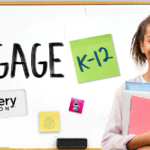TRANSFORMATION AND INNOVATION HAPPEN AT THE SPEED OF TRUST
By Robert Martellacci, Originally published in the March/April 2020 issue of AC&E/Equity & Access
C21 Canada CEO Academy leaders and advisory board members recently ventured up to Whitehorse, Yukon for its semi-annual Summit in partnership with the Yukon Department of Education.
The Yukon is most famous for the Klondike and the Gold Rush of the 1800’s, a stereotypical image often painted of this spectacular rugged territory that is steeped in history. Did you know that at the conclusion of the gold rush in 1898, the government of the day built what was known as the Worldwide Network for communications in Whitehorse?
It’s been said that transformation and innovation happen at the speed of trust; so fitting for the setting the stage for the our visit.
We were warmly welcomed by Whitehorse community leaders
This summit’s theme of Cultural Responsiveness, Relationships and Common Messages provided an opportunity for education leaders to learn about Yukon’s approach to student learning in Kindergarten through Grade 12 public education. Discussions included culturally responsive assessment and learning, Yukon First Nations Education Agreements, as well as how Yukon schools work in partnership with Yukon First Nations governments to support learning that is grounded in the community context and focused on reconciliation.

As I reflect on our recent C21 CEO Academy Winter Summit co-hosted with the Yukon Department of Education, I’m struck by the beauty, richness in history and the kindness of the Yukon people. Equally impressive is the innovative spirit of the Yukon education system leaders and the respect now being paid to first nations people. The theme, Change happens at the speed of trust ~ Indigenizing Leader Perspectives was very fitting for education leaders who gathered from across Canada.
It was fascinating to be immersed in the Yukon culture and to learn about the challenging journey of the first nations people and the innovative collaborative process in transforming the Yukon curriculum.
It was such an honour to partner with the Yukon Department of Education on this very important C21 Summit. As a first timer to the Yukon, I can assure you that I will return to further explore the region for its beauty, history and the people.
In closing, two words that comes to mind, ‘respect’ and ‘hope’ for the first nations people as we enter this period of reconciliation. Hence, I feel that it’s never been a more exciting time to be in education; to drill more deeply into Canada’s history and reconcile the lost parts and give credit and respect where it’s due, infusing the richness and culture of first nations peoples in our daily lives.
WHAT DO INDIGENIZED ASSESSMENT AND LEARNING LOOK LIKE?
What’s going on with learners in the Yukon? How do we know? Why does it matter?
Education leaders from across Canada gathered in Whitehorse for the C21 Canadians for 21st Century Learning & Innovation CEO Academy Winter Summit. This was the first time this summit has taken place in Yukon.
“We are excited to be hosting education leaders from across the country here in Whitehorse. This summit is a great opportunity to share stories about the collaboration underway with Yukon First Nations in Yukon schools to support student learning and outcomes for all students, including examples of how Yukon First Nations ways of knowing, doing and being are included in Yukon’s curriculum and school programs.” — Tracy-Anne McPhee Canadian Minister of Education

This summit’s theme of Cultural Responsiveness, Relationships and Common Messages provided an opportunity for education leaders to learn about Yukon’s approach to student learning in Kindergarten through Grade 12 public education. Discussions included culturally responsive assessment and learning, Yukon First Nations Education Agreements, as well as how Yukon schools work in partnership with Yukon First Nations governments to support learning that is grounded in the community context and focused on reconciliation.
The summit kicked off with an opening reception at MacBride Museum on Sunday, Feb. 23 with presentations by Deputy Minister of Education Nicole Morgan and Yukon University Associate Vice-President of Indigenous Engagement Tosh Southwick. Participants visited Elijah Smith Elementary School and the Haa Shagóon Hídi, the learning centre in Carcross, to gain immersive learning experiences.
During the summit, the C21 Canada presented the Shifting Minds Learning and Innovation Acknowledgement to recognize all voices in Yukon, including Yukon First Nations, who have contributed to Yukon’s student-centred and culturally responsive classroom assessment model, and on creating a leading model of reconciliation for all Canadians.
“We are honoured to be co-hosting the C21 CEO Academy Winter meetings with the Yukon Department of Education in Whitehorse. The Shifting Minds Acknowledgement is a token of our appreciation in recognition of our partnership, and leadership and innovative spirit demonstrated by the Yukon Department of Education.” — Robert Martellacci, CEO & Co-founder, C21 Canada.
The American Consortium for Equity in Education, publisher of the "Equity & Access" journal, celebrates and connects the educators, associations, community partners and industry leaders who are working to solve problems and create a more equitable environment for historically underserved pre K-12 students throughout the United States.
- American Consortium for Equity in Educationhttps://ace-ed.org/author/admin/
- American Consortium for Equity in Educationhttps://ace-ed.org/author/admin/April 23, 2025
- American Consortium for Equity in Educationhttps://ace-ed.org/author/admin/
- American Consortium for Equity in Educationhttps://ace-ed.org/author/admin/







